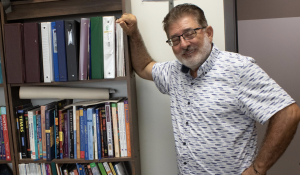Legischool brings teens to the Capitol
December 11, 2008
California has a shortage of skilled trade workers like welders and plumbers, which causes jobs to be outsourced to other states. Many high school graduates, though, do not consider technical or vocational education programs. A town hall meeting with high school students sponsored by Sacramento State’s LegiSchool project examined the reasons behind this and what the state could do about it.
High school students from Rio Americano and Grant High Schools in Sacramento, Kennedy High School in Fremont, Lodi High School and Verdugo High School in Los Angeles asked questions of a panel of policy makers.
“There is an old fashioned view of career technical education,” said Paula Hudis of ConnectEd, who moderated the event. She said many parents do not understand how vocational programs are different today, and pass that viewpoint to their children.
Since taking office, Gov. Arnold Schwarzenegger has promoted the state’s technical education programs, which can train students to be mechanics, chefs, and other specialized fields.
Eliminating social stigmas surrounding technical education and encouraging students who may be interested in alternatives to four year colleges could prove beneficial to California, said Susanna Cooper, a consultant with President Pro Tem of the State Senate Darrell Steinberg’s office. Vocational skills could help as the economy changes, Cooper said.
“If we play our cards right we should have a really booming green economy in California,” Cooper said.
Vocational schools have the advantage of teaching concrete skills and sometimes lead to better job prospects than four-year degrees, despite being perceived as lower in status. Students’ emphasis on four year colleges can sometimes be doing them a disservice, said Anthony Monreal, deputy superintendent for curriculum and instruction at the state’s Department of Education.
“We are preparing you for jobs that do not exist,” Monreal said.
Megan Thorall, LegiSchool project coordinator, said that the event provided high school students a unique opportunity to interact with policy makers and experience the inner workings of state government. For students from Rio Americano’s Civitas program – an academy which focuses on civic engagement – the meeting carried additional relevance, Thorall said.
The purpose of the project, founded in 1994, is to engage high school students in the political process by having them discuss issues that impact their lives. Past town hall meetings have tackled the issues of violence in schools, education reform and affirmative action. Five town hall meetings are held each year, including a student journalism summit.
This was the second LegiSchool town hall meeting this school year. In February, the group will tackle the issue of offshore oil drilling and in April, teens will be invited to debate California’s new law banning all cell phone use by drivers under age 18. Participants for the April event will be selected from an essay contest.
Three quarters of the students were seniors, many of whom are in the midst of college applications and crucial decisions about their future.
“Some of these kids could really benefit from knowing all the options that are available to them,” Thorall said.
In the near future, fewer students will be able to attend public universities in California because of budget cuts, and vocational school could be a way for lower achieving students to find lucrative sources of employment.
Francisco De La Paz, a senior at Fremont’s Kennedy High School, took issue with this, saying that these students are disproportionately minority students and redirecting them into a different educational path would repeat past injustices. He said he worried that less affluent students would be steered toward vocational training.
“I don’t think you can ever call a blue collar job – even though you make the same amount of money as a white collar job – equal,” De La Paz said. “It’s still blue collar and the other one’s still white collar.”
He said he thought a four-year college taught students a global world view that could not be matched by vocational training.
Vocational programs like woodshop classes can be the first to be cut at California schools because they are not measured by standardized tests, said Paul Navarro, deputy legislative secretary for the Governor’s Office. Districts would not eliminate these courses if the state made them graduation requirements.
Some students at the event took issue with being forced to take a mandated vocational class they were not interested in, but Navarro countered that students interested in vocational education would feel the same way about traditional curriculum like English and math.
Alix Powell, a sophomore at Rio Americano High School, said she already had problems fitting everything into her class schedule without having to take a required vocational education class.
“(The panelists) gave a lot of options,” Michael Ofek, a sophomore at Rio Americano, said. “I don’t know if any of those options will actually be realistic.”
Sam Pearson can be reached at [email protected]


























































































































